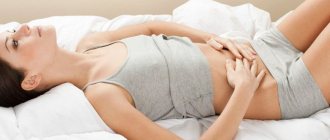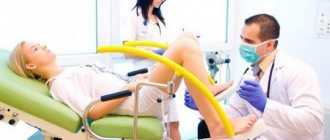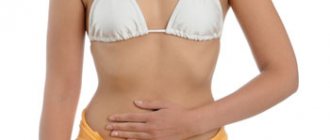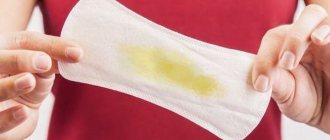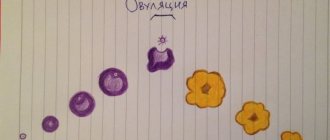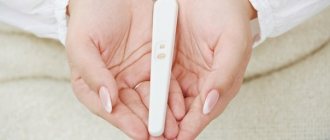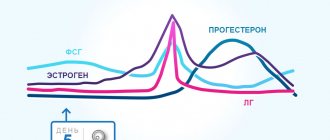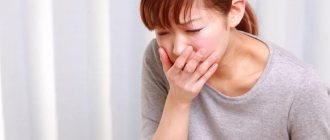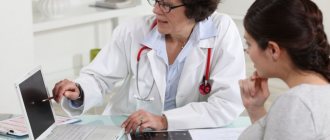Features of the menstrual cycle
Usually, by the age of 18-19, the female body is already ready for motherhood, the reproductive function fully takes effect. Optimal conditions for egg maturation are created monthly. It is this organism that, when meeting a sperm, takes part in the maturation of the embryo. The duration of the menstrual cycle is individual for each representative of the fairer sex. This period can last from 21 to 45 days. The average is 28 days.
As a rule, ovulation occurs in the middle of the menstrual cycle. During this period, the ovary releases an egg. If unprotected sexual intercourse occurs at this time, there is a high probability of pregnancy. In this case, the sperm remains active for 5 days. Therefore, the likelihood of conception may remain even if sexual intercourse took place before ovulation.
It is not uncommon for nipples to hurt after ovulation. This symptom is associated with changes in a woman’s hormonal levels. If conception does not occur within 10-12 days, menstrual bleeding should be expected.
Candidiasis and conception
Some women believe that thrush that began even before the delay of menstruation, coinciding with unprotected sexual intercourse, indicates pregnancy. There really is a connection between them: blood rushing to the pelvis provokes an increase in vaginal discharge, and an increase in estrogen production affects its flora. These two changes in the reproductive organs create conditions favorable for the proliferation of Candida fungi. Excessive amounts of them cause thrush. The appearance of candidiasis, itching and curdled discharge are unlikely to confirm conception. These signs of pregnancy are questionable: thrush is more likely a consequence of conception than a symptom.
If pregnancy does occur
Changes in the breasts are one of the first signs of conception. However, if your nipples hurt after ovulation, you should not immediately go to the pharmacy for a test. Even if pregnancy has occurred, it can be confirmed only from the first days of missed menstruation. It is during this period that the fertilized egg implants into the endometrium of the uterus.
If after ovulation your nipples hurt more than usual, you should start taking folic acid. If pregnancy does occur, B vitamins will only benefit the expectant mother and child. Additionally, you should give up bad habits and start eating right.
In addition to discomfort in the chest, you should pay attention to other possible signs of pregnancy. Against the background of hormonal changes occurring in the body, a woman becomes drowsy and cannot fully cope with everyday responsibilities. Already in the early stages of pregnancy, taste preferences may change. The expectant mother consumes foods that were previously absent from her diet.
Already in the first days of pregnancy, weight gain may be observed due to fluid retention in the body. It is worth paying attention to body temperature. In the early stages of pregnancy, this figure can reach 37 degrees Celsius.
Do your nipples hurt after ovulation? In most cases, mild discomfort is normal. If the discomfort intensifies, you should see a doctor as soon as possible. Chest pain may indicate serious problems.
How to relieve pain
If any pathology in the chest is diagnosed, the doctor prescribes drug therapy (hormonal drugs, anti-inflammatory drugs, antibiotics, depending on the nature of the disease). But many women wonder what to do if the pain is caused by natural causes. Usually no special treatment is required, but there are ways to significantly alleviate unpleasant symptoms:
- To restore normal blood circulation, you can take synthetic vitamin P or products containing it - citrus fruits or tea with raspberries, rosehips, currants.
- In the case of cyclic mastodynia, twig extract helps a lot. This herbal preparation balances the production of hormones and thereby alleviates painful symptoms. The product is prohibited for use by pregnant women and during lactation.
- Another non-hormonal drug is Mastodinon. Helps cope with pain during cyclic mastodynia during ovulation.
- Following a special diet during ovulation will help significantly reduce pain in the nipples and breasts. During this period, you should refrain from fatty and spicy foods, caffeine, alcohol and sweets. You should eat more fresh fruits and vegetables, fish, and foods rich in magnesium. In addition, you can take Magnesium B6.
- Chest pain during ovulation may intensify if a woman experiences severe stress or nervous tension during this period. Then it is advisable to take herbal sedatives - motherwort, valerian, drink tea with peppermint.
- You can use traditional medicine recipes. Many herbs help relieve breast and nipple pain during ovulation and even have an anti-inflammatory effect. Such herbs include chamomile, calendula, St. John's wort, nettle, and dandelion root. You can choose one plant or mix them and brew herbal tea. You can drink it several times a day until the unpleasant symptoms disappear, but before use you should make sure that you are not allergic to plant components.
Pain in the nipples before, during and after ovulation in most cases is not a pathology and indicates the normal functioning of the reproductive system. However, if the pain does not stop with the arrival of menstruation or other symptoms appear, you should consult a doctor for a comprehensive diagnosis and, if necessary, prescribe treatment.
Failure of the menstrual cycle
Many representatives of the fairer sex have to deal with false pregnancy. If the nipples are very sore after ovulation and the next menstrual bleeding does not occur, the woman decides that she will soon become a mother. During registration, it turns out that there is no pregnancy. Due to hormonal imbalances, the menstrual cycle was disrupted.
The most common cause of this condition is a pelvic infection. The risk of encountering the disease is much higher in those girls who are promiscuous. Such infections can be very dangerous. If you refuse timely therapy, the risk of irreversible infertility increases.
Hormonal disorders can be observed against the background of thyroid diseases. Therefore, if after ovulation the nipples hurt and pregnancy does not occur, the woman will be referred for examination to an endocrinologist.
Why didn't the pain go away?
There are cases when, after ovulation, the nipples and breasts do not stop hurting. Doctors say that this is a sign of improper functioning of the hormonal system. In the period after the release of the egg, the pituitary gland does not stop producing progesterone and produces it into the woman’s blood until the onset of menstruation. This leads to the fact that a woman’s nipples continue to hurt throughout the second remaining period of the cycle.
Such hormonal imbalances lead to the development of cystic formations in the breast. Therefore, if a woman notices that her nipples hurt or become sensitive in the period after ovulation and before the onset of menstruation, she should contact a mammologist to clarify the reasons for this behavior of the mammary glands.
Mastitis
If your nipples hurt immediately after ovulation, an inflammatory process may develop in the breast tissue. Mastitis is a pathological process that is characterized by the entry of pathogenic bacteria into the milk ducts. Breastfeeding women who do not adhere to breast care rules are more susceptible to the disease. However, pathology can also occur in nulliparous representatives of the fairer sex.
The most common cause of mastitis is a staphylococcal infection. It enters the chest through the nipple. Sometimes the disease has a secondary form and develops as a complication of other infectious diseases (cystitis, pneumonia, sinusitis, etc.). In nursing mothers, mastitis can develop against the background of prolonged lactostasis (stagnation of milk in the ducts).
At the slightest suspicion of mastitis, a woman should be referred for consultation to a mammologist. The disease is treated using antibacterial drugs. Advanced forms of mastitis require surgical intervention.
What can be done to relieve pain?
There are many ways to eliminate the discomfort that occurs after ovulation. Traditional medicine and traditional therapy offer their own methods, and there are also recommendations that women make on their own.
Herbal medicine
has good effectiveness indicators . Regular use of decoctions of St. John's wort, chamomile or calendula not only has a healing effect, but also makes the natural process of releasing an egg from the follicle less painful.
To relieve pain it is recommended:
- increase the amount of fluid consumed;
- start a course of taking vitamins;
- diversify your diet;
- apply a heating pad to areas of pain (applies to the lower back, uterus, ovaries and lower abdomen);
- change your bra to one with supportive cups (will eliminate chest discomfort);
- The symptoms of the postovulatory period can be relieved with painkillers .
Breast cyst
Menstruation has arrived, but the pain in your nipples has not gone away? You should go for a consultation with a gynecologist immediately. It is possible that a neoplasm is developing in the mammary gland. At best, it will be benign. We are talking about a cyst. The pathology occurs in 30% of women of childbearing age.
A cyst can form due to an enlargement of one of the ducts of the mammary gland. In most cases, the tumor does not exceed a few millimeters in diameter. However, there are also giant cysts up to 5 cm in size.
Small tumors are very difficult to palpate. At the same time, a woman may not always understand why her nipples hurt after ovulation. This symptom may just be associated with the appearance of a cyst. Therefore, even minor changes in well-being are a reason to seek a consultation.
If the cyst is small, it can be eliminated with hormonal therapy. If the formation is large, surgery cannot be avoided.
Questionable signs
There are quite a few signs of pregnancy in the first month, which are likely signals of what has happened. On the 20th day of the cycle, it is quite difficult to notice the still subtle signs of pregnancy, but their manifestation already in the second week immediately after conception becomes more intense.
Presumable signs of pregnancy individually often do not attract attention, but taken together they can alarm the expectant mother even before the delay, forcing her to find out exactly about her situation.
Breast changes, dizziness, changes in food preferences are the most likely signs recorded by almost every pregnant woman.
Weakness and loss of strength
These are the most pronounced symptoms at the beginning of pregnancy, caused by changes in the hormonal background of the body and in the functioning of other internal systems after conception. Attachment of the fetus to the uterine mucosa changes the content of progesterone and body temperature, which is why the woman feels a deterioration in her health. Many people are worried about dizziness, weakness, runny nose and other conditions that are not typical for normal days during pregnancy:
- the woman feels cold, she shudders, and after a short period of time she feels hot;
- spontaneous headaches occur;
- drowsiness, loss of strength, and fatigue appear that are unusual for a woman;
- troubled by sleep problems.
Pain in the back and lumbar region
Complaints of back pain or lower back strain are usually heard in the second and third trimesters, but they are also considered as presumptive signs of pregnancy, sometimes appearing even before the delay a little time after sexual intercourse without contraception. Such sensations may be a sign of an impending miscarriage and require the assistance of a doctor.
Breast and nipple changes
Most often, such symptoms are recorded on days 20-22 of the cycle: the mammary glands swell and increase in size. These signs of pregnancy, as well as itching of the skin on the chest, should alert the woman a few days after contact without contraceptives: the likelihood of conception becoming quite tangible.
Can breasts get bigger immediately? Most women notice breast enlargement in the first months of pregnancy. At the same time, the sensitivity of the breast increases, any touch causes pain. It may begin to itch: often women, even at the beginning of pregnancy, note that their nipples hurt.
Heaviness and fullness in the uterine area
On the 23rd day of the cycle, uncomfortable signs of pregnancy such as heaviness in the lower abdomen and a feeling of fullness in the uterus are often observed. During pregnancy, they are caused by a rush of blood to the reproductive organs, where the embryo has already settled. With a short cycle lasting less than four weeks, such discomfort may appear as early as the twentieth day.
Due to the rush of blood to the pelvis, a pregnant woman may also be bothered by tingling in the projection of the ovaries or uterus - another likely signal of pregnancy.
Hormonal storms of gestation
What other symptoms before delayed menstruation and hCG test results indicate that conception has occurred? Hormonal changes in the body are associated with numerous and noticeable signs of pregnancy in most women already on days 21-25 of the cycle:
- a sharp change in taste preferences: a woman rejects her usual food and begins to consume “exotic” or previously unloved foods;
- aversion to certain aromas or odors;
- the appearance of acne on the skin of the face, pimples, even if the pregnant woman has never had such problems before;
- increased frequency of urination, especially at night: they are not accompanied by pain or discomfort;
- swelling affecting the arms and legs; they are caused by an increase in the level of progesterone, which retains salt and fluid in the body;
- decreased libido;
- noticeable changes in the emotional state: they are expressed in outbursts, mood swings, sometimes strong reactions to insignificant things, irritability appears, conflicts arise.
Mammary cancer
If your nipples begin to hurt after ovulation and this symptom has not been observed before, you should make an appointment with an oncologist. The earlier breast cancer is diagnosed, the greater the chances of completely defeating the disease. Women aged 25 to 60 years are susceptible to pathology. Breast cancer is much less common in men. There is a certain genetic dependence. If there were women in the family with a similar diagnosis, the risk of encountering pathology increases significantly.
The risk of developing cancer increases in women suffering from endocrine disorders - diabetes mellitus, thyroid pathologies. Representatives of the fairer sex who have bad habits or suffer from drug addiction or alcoholism are at risk.
Breast cancer responds well to treatment if detected at an early stage. Small tumors are removed while maintaining the integrity of the breast. In case of large formation, the mammary gland is completely removed. Additionally, radiation or chemotherapy is performed.
Pathological processes
A woman should seek medical help if her nipples hurt for a long time and persistently. This may be a harbinger of the following pathological conditions:
- mastopathy;
- endometriosis;
- nipple cracks;
- purulent inflammation of the breast tissue;
- tumors.
You should not attribute the symptoms in question to changes in weather or mood. This should prompt the patient to visit the clinic.
Mastopathy
Against the background of hormonal imperfections in the body, connective tissue may begin to grow in the mammary gland. This leads to the formation of dense nodes of different diameters. A woman develops mastopathy. The nodules have different diameters and shapes, and there can be a huge number of them. Their value changes in different phases of the cycle.
Mastitis
Most often, this disease affects nursing mothers. This is facilitated by:
- hypothermia of the chest;
- nipple cracks;
- inflammation in the uterine cavity.
Throughout the lactation period, milk flows out of the milk ducts in small portions. If mommy does not adhere to basic hygiene rules and does not change the lining in her bra, bacteria begin to multiply on it. Through the same ducts or microcracks they enter the gland tissue, contributing to the development of mastitis.
Sometimes a problem arises when more milk has been produced than the baby is able to drink, because he could get sick or eat complementary foods. In this case, the woman is recommended to express milk. If this does not happen, the risk of developing mastitis increases.
With this disease, the breast becomes unnaturally hot to the touch, increases in size, and becomes denser. The skin over the site of inflammation turns red. Along the edge, the contours of the focus of redness are uneven and blurred. Since the uterus has not yet recovered after childbirth, this pathology immediately affects its condition - vaginal discharge appears or intensifies, and tugs in the lower abdomen.
The temperature rises, the woman shudders. Greenish pus appears from the nipple. Fortunately, mastitis is most often a one-sided disease, and the symptoms are stopped at an early stage.
Oncology
Unfortunately, the problem of cancer does not bypass women of any age. This problem can provoke painful sensations, which only intensify in the middle of the cycle. The pain is nagging in nature, appears periodically at first, and becomes constant over time. A clear fluid is released from the nipple, and blood may leak. When you feel it under your fingers, you can feel a compaction.
The diagnosis described comes as a shock to both the woman herself and her family. This is one of the reasons why a visit to the doctor is postponed for as long as possible. Sometimes this only happens when the process moves to the lymph nodes.
Endometriosis
Any disease in the area of a woman’s reproductive system can lead to breast pain. Endometriosis is a pathological process that develops against the background of hormonal imbalance in the body of the fairer sex. In the body of the uterus, glandular tissue, the endometrium, grows. The result is discomfort in the abdomen and chest. According to statistics, endometriosis ranks third among all gynecological diseases.
If your stomach and nipples hurt after ovulation, you should undergo a full examination of the reproductive system. The course of the disease can be varied. Chest pain is just one of the unpleasant signs. Much more often women complain of dysmenorrhea. Severe pain develops during menstrual bleeding. Discomfort during sexual intercourse may indicate the growth of the endometrium in the cervix and vagina.
How much do nipples hurt?
Normally, pain persists for 2-3 days after the formation of the egg. There is no need to worry, but it is recommended to have tests done by a gynecologist once every 6 months. If discomfort persists for a long time and does not disappear after the end of menstruation, this is a reason for a full examination.
Additionally, the following symptoms may occur, which should be reported to your doctor:
- incorrect time of the appearance of menstruation (for example, formation in the middle of the cycle);
- itching, burning in the vagina, lower abdomen;
- milky discharge from the breast;
- constant migraines;
- mood swings.
If the symptoms of diseases of the reproductive system do not go away during treatment, they seek help again. The drug intake is adjusted and tests are repeated. Therapy methods are followed strictly.
Uterine fibroids
This is a benign formation of the uterus, against which nipple soreness can also develop. Fibroids can develop from a small nodule from a large tumor weighing more than a kilogram. The exact reasons for the development of the pathological process cannot be named. However, it was noted that hormonal disorders in a woman’s body are a predisposing factor. Myoma often appears in girls who start taking oral contraceptives without consulting a doctor.
Small uterine fibroids can develop without any clinical advice. In this case, a woman may only notice soreness in the nipples after ovulation. Menstrual bleeding also becomes more painful. As the tumor grows, the abdomen begins to enlarge. Menstrual bleeding becomes heavy. In addition, sudden cramping pain may occur.
Small fibroids can be treated conservatively. The woman is prescribed therapy to normalize her hormonal levels. Large tumors must be surgically removed.
Additional diagnostics
Cases where the breasts swell after ovulation and the nipples hurt can be explained by completely physiological reasons. But it is imperative to exclude pathology, which is where additional methods help. Based on the doctor’s assumptions, the woman will need to undergo some types of laboratory and instrumental diagnostics:
- General blood and urine tests.
- Blood biochemistry (hormones, markers of inflammation and tumor growth).
- Analysis of nipple discharge.
- Mammography.
- Ultrasound of the mammary glands, ovaries, uterus.
- Tomography.
And only on the basis of a complete examination can a conclusion be made about the cause of painful sensations in the nipples. Basically, doctors confirm the individual characteristics of the menstrual cycle, the onset of pregnancy or mastopathy. But for some women the situation takes a different turn - a serious pathology is revealed. Therefore, you need to understand the importance of early diagnosis and not neglect examination by a specialist.
Girls, maybe someone will be interested, I found some interesting information for myself:
Some days after ovulation, a woman feels that her breasts and nipples hurt. This is due to the fact that the female body goes through cyclical periods every month from the moment of puberty until the onset of menopause, which are accompanied by changes in hormonal levels. This is called the menstrual cycle. Unpleasant sensations during menstruation are considered normal for women. But the issue of pain in the breasts and nipples the day after ovulation remains a mystery to many. Let's figure out what causes such changes in a woman's body.
Features of the reproductive system If pregnancy does not occur in a woman’s body, then every month the body creates optimal conditions for the maturation of the egg, its release from the follicle, fertilization and the onset of conception. To do this, the body produces a whole complex of hormones that contribute to this process in the body. Breasts and nipples are a very sensitive organ, which is one of the first to respond to any changes in the body, including hormonal ones. Ovulation occurs approximately on days 10-14 of the cycle. The date is unclear, as it depends on the individual characteristics of the female body and the duration of the menstrual cycle as a whole. During this period, the egg breaks the walls of the follicular sac and leaves the ovary. Moving along the fallopian tubes, she is completely ready for fertilization. Immediately after the release of the egg, a hormone is produced in the woman’s body, which is designed to begin preparing the woman’s entire body for pregnancy in the event of successful fertilization. Its appearance also affects the woman’s mammary gland: it swells; painful sensations are felt; nipples become sensitive and sore. Pain that appears during this period in the chest and nipples is called cyclic mastodonia. A day or two after ovulation, provided there is no pregnancy and no conception, the woman’s body stops producing progesterone, and pain in the nipples goes away. Why didn't the pain go away? There are cases when, after ovulation, the nipples and breasts do not stop hurting. Doctors say that this is a sign of improper functioning of the hormonal system. In the period after the release of the egg, the pituitary gland does not stop producing progesterone and produces it into the woman’s blood until the onset of menstruation. This leads to the fact that a woman’s nipples continue to hurt throughout the second remaining period of the cycle. Such hormonal imbalances lead to the development of cystic formations in the breast. Therefore, if a woman notices that her nipples hurt or become sensitive in the period after ovulation and before the onset of menstruation, she should contact a mammologist to clarify the reasons for this behavior of the mammary glands. Pain as a sign of pregnancy As in the case of increased sensitivity of the nipples at the moment after the release of the egg, the onset of pregnancy also causes significant hormonal changes in a woman’s body. After successful conception, the same progesterone increases tens of times in the blood, creating optimal conditions for the attachment of a fertilized egg to the walls of the uterus. Estrogen joins it. They are what cause the nipples to ache and become sensitive. Small bumps appear on the areolas, which can cause varying degrees of pain. Sensitivity and pain in the nipples is one of the earliest signs of pregnancy. Dozens of studies in this area have proven that nipple pain after successful fertilization plays a protective role. In this way, the body protects itself from miscarriage. Why is this related? Everything is very easy to explain. After ovulation, increased sensitivity and soreness of the nipples preclude their stimulation, during which the uterus becomes toned (muscle contraction occurs), and this process does not contribute to the attachment of the egg to its walls. Therefore, nature took care, and after fertilization the nipples begin to ache, which helps maintain pregnancy.
Individual characteristics of the body About 5% of women have very sensitive areolas, which is due to the peculiarity of their structure and location of nerve endings. During the period of egg release, their sensitivity increases several times and can even be painful. Such sensations of increased sensitivity, which are associated with a structural feature, do not come suddenly, but appear from the beginning of puberty and last throughout life with characteristic pain during the ovulation period.
Other causes of pain in the nipples Women experience pain in the nipples for reasons that have nothing to do with hormonal changes in the body. These include: side effects of certain drugs; sunbathing “topless” both in the sun and in a solarium; the body's reaction to a sudden change in temperature; at the time of breast growth in young girls; menopause period; improper hygiene; congestion in the chest area; injury to the nipples or an incorrectly selected bra. All these factors can cause nipple pain in a woman. Pathological processes that cause pain in the nipples The topic has already been touched upon that the nipples hurt immediately after ovulation and before the onset of menstruation as a result of hormonal imbalance in a woman’s body. This is already considered a reason to contact a mammologist for additional research and diagnosis. Such hormonal disruptions occur as a result of many serious diseases: polycystic changes in the ovaries; uterine fibroids; endometriosis; diseases of the endocrine system (diabetes mellitus, thyroid disease). Often, to find out the true cause of such pain in the nipples in the period after ovulation, it is necessary to consult several doctors. The reasons why the nipples began to ache after the release of the egg and continue to ache all subsequent days of the cycle are considered to be possible diseases of the mammary gland. The formation of scars and adhesions, which is also associated with long-term hormonal imbalance in a woman’s body. The appearance of benign cystic formations. They are formed from stretched duct tissue and filled with fluid. Very often they cause pain not only in the nipples, but throughout the entire breast. Diffuse mastopathy. Fungal infection of the delicate skin of the nipples. Mastitis. All these diseases lead to the woman noticing that her nipples are very sore not only after ovulation, but throughout the entire cycle. Such diseases are especially undesirable for young women, as they affect the quality of breastfeeding and can cause serious problems with it in the future. Therefore, if such signs are noticed, you need to see a doctor to clarify the diagnosis and prescribe therapy. When should you sound the alarm? We are all accustomed to the fact that when some organ begins to hurt severely, this signals a disease. The same applies to the chest. But pain on the day of ovulation in the female mammary gland and nipples does not always signal a disease. So, if it appears after 14 days of the menstrual cycle and goes away after a few days, then these are normal processes in the female body, and it does not require special therapy.
But there are characteristic indicators of pain in the nipples that signal a possible illness. These signs include: severe pain in one of the nipples, which signals a possible onset of mastopathy; painful sensations do not subside or begin on the 14th day of the cycle and continue until the onset of menstruation; discharge from the nipples of a purulent or sanguineous nature began to appear; the appearance of hemorrhage or swelling; visual changes in the nipple or halos; seals appeared in the nipple area. If a woman notices such manifestations in the area of her nipples, then she should immediately consult a doctor for advice. Why is it important? Any disease can be cured faster at an early stage, which is why early diagnosis of ailments of this organ is so important. To avoid such diseases of the mammary gland, it is important to properly care for it and select underwear. Keep a monthly calendar of your cycle, where you write down not only the day your period begins, but also all the sensations that arise in your body during the entire cycle. This will make it possible to timely separate normal pain from pathological ones and consult a doctor in time for advice.
Many women experience sore nipples after ovulation. Such discomfort on certain days of the menstrual cycle is felt from the moment of puberty until menopause. This is due to the functioning of the female reproductive system and hormones. As a rule, discomfort in the nipples and breasts occurs during ovulation, but sometimes regardless of it. Therefore, we will further consider in what cases pain in the chest and nipples is caused by functional natural causes that do not require treatment, and when by various diseases.
Throughout the entire menstrual cycle, a woman’s hormonal levels are unstable. With normal functioning of the female reproductive system, ovulation occurs on days 10-16 of the cycle. It is impossible to predict the exact date of ovulation, because it is influenced not only by the individual characteristics of the body, but also by various external factors that can lead to disruptions (stress, illness, changes in climatic conditions, etc.).
Immediately before and during ovulation, the body begins to intensively produce the hormone estrogen, which helps the egg mature. By the middle of the cycle, its amount can double or even triple. It is because of estrogen that breasts begin to swell and nipples ache. This is how the body prepares for the process of lactation if pregnancy occurs.
After the release of the egg from the dominant follicle, a so-called follicle is formed in its place, which actively produces another “female” hormone - progesterone, which is needed to maintain pregnancy. Progesterone is also a factor that increases breast and nipple sensitivity. During this period, the breast greatly increases in size and hurts. The nipples may darken a little and hurt when touched.
Thus, pain in the nipples during ovulation is a natural process that speaks of a woman’s health, and not of any pathology.
If the question arises as to why nipples hurt before ovulation, there are also hormonal reasons here. This is how the body signals the imminent onset of ovulation. It is considered normal for pain to occur 1-2 days before its onset.
After the egg has left the follicle and ovulation has occurred, pain can persist for up to several days. Some women note that their nipples hurt after ovulation, and the discomfort does not go away until the onset of menstruation. This is also not any pathology, and speaks only of the individual characteristics of the body. In this case, doctors diagnose cyclic mastodonia. This condition does not require treatment; you can only take medications that alleviate the unpleasant symptoms.
Sometimes, when nipples hurt after ovulation, we can talk about improper functioning of the hormonal system. Progesterone is produced until the onset of menstruation, so the pain does not stop until it occurs. If this situation occurs constantly, you should consult a doctor for examination for hormonal imbalance and hormone correction.
Polycystic ovary syndrome
You should also be wary if your nipples stop hurting after ovulation. This symptom may indicate that the ovaries are not functioning properly. Polycystic disease is a disease that requires timely medical care. Multiple cysts begin to grow on the surface of the ovaries. As a result, the menstrual cycle becomes disrupted and the risk of irreversible infertility increases.
Treatment of the disease is aimed at restoring ovulation. As a rule, a woman is prescribed hormone therapy. Additionally, you need to improve your diet and make an appointment with a physiotherapist.
Symptoms
When a woman is bothered by pain in the nipple area or throughout the entire breast, she should pay attention to all possible symptoms. After all, you can find out the reason for the changes only by finding out the full picture. And questioning and examination help with this - the main methods of medical examination at the primary stage.
Each symptom needs to be detailed. Breast pain is no exception. It can take on a different character:
- Bursting, shooting, aching.
- Only in the nipple area or spreading to other areas.
- Weak, moderate or strong.
- Occurs after ovulation or without connection with the menstrual cycle.
Many women only talk about increased sensitivity of the nipples; they become thicker and protrude, as if during sexual arousal. Sometimes hyperesthesia becomes stronger and develops into pain. Then any touch to the chest, even with ordinary clothes, causes significant discomfort. But as a rule, this stops with the onset of the next period. If this is exactly the case, then there is no need to worry - most likely there is an individual reaction to cyclic hormonal changes. Other manifestations may also occur:
- Fatigue.
- Irritability.
- Changes in taste and smell.
- Frequent urination.
- Discomfort in the lower abdomen.
If this is combined with a delay in menstruation, then it’s time to take a pregnancy test, because engorged nipples may be evidence of a previous conception. But certain signs should still be a reason for a detailed examination, since most often they talk about pathology. Such manifestations include:
- Severe pain in one breast, which does not depend on menstruation (persists with their arrival).
- Discharge from the nipple (purulent, bloody).
- Skin redness, wrinkles, ulcers.
- Breast deformation.
- Retraction of areola and nipple.
- Palpable lump in the gland.
This may indicate the development of a tumor process, so it is important to notice alarming symptoms in a timely manner and immediately consult a doctor. Any disease, including breast cancer, must be treated in the early stages - it is much more effective and less likely to recur.
You need to pay attention to all the symptoms that accompany chest discomfort, especially those that are considered “alarming.”
Other causes of nipple pain
In some cases, pain in the breasts and nipples is not associated with either ovulation or pregnancy. Then other causes of this condition should be considered.
Not a pathology
Sometimes sore nipples are caused by external irritants. This could be incorrectly selected and uncomfortable underwear, which puts pressure on the nipples and causes friction, various personal hygiene products (soap, shower gel), and skincare products (creams, lotions). You can also damage your nipples with a washcloth that is too hard.
Tanning without proper protection can also cause pain in the nipples, since their skin is very delicate and is riddled with a huge number of nerve endings. Therefore, when tanning in a solarium, you should use special “stikinis” made of foil, and it is not advisable to sunbathe topless on the beach.
Sometimes nipple pain is caused by hormonal drugs (contraceptives). This indicates that the medicine was chosen incorrectly and should be changed.
Disease-related
In some cases, pain is associated with various disorders and pathologies. The most common among them are the following:
- fibrocystic mastopathy;
- mastitis;
- tumor formations;
- endocrine diseases such as diabetes mellitus or abnormal functioning of the thyroid gland (hyper- or hypothyroidism, autoimmune thyrotoxicosis);
- , in which improper production of hormones occurs;
- benign neoplasms in the ovaries and uterus (fibroids);
- endometriosis of the uterus;
- other hormonal disorders.
If you experience any of the following symptoms in addition to chest and nipple pain, you should consult a doctor immediately:
:
- discharge from the nipples of a purulent or bloody nature;
- lumps in the chest;
- itching in the nipples or their redness;
- increased body temperature (often occurs with mastitis).
All of these diseases have different accompanying symptoms, but they are united by one symptom – pain in the nipples and breasts. Therefore, at the slightest suspicion of any disease, you should immediately contact a gynecologist, endocrinologist, or mammologist.
Nipple pain and pregnancy
Nipple pain is also one of the early signs of pregnancy.
In this case, pain, as with ovulation, is caused by excessive production of hormones - progesterone and estrogen. The concentration of progesterone in the blood increases several times, due to which the fertilized egg successfully attaches to the walls of the uterus. And estrogen helps to increase breast size. Small bumps may appear on the nipples, which increase their soreness and sensitivity. This is the preparation of the breast for subsequent lactation.
Pain in the nipples during pregnancy also serves a protective function, protecting the body from a possible miscarriage. This is due to the fact that the soreness of the nipples excludes their stimulation, that is, touching them, which tone the uterus. Thus, there is no contraction of the muscles of the uterus, and the embryo successfully attaches to its walls and begins to develop.
